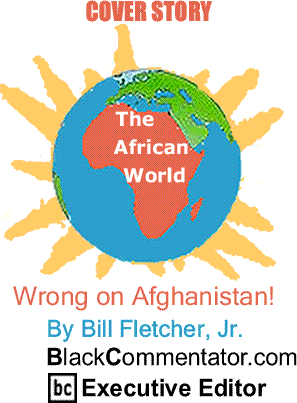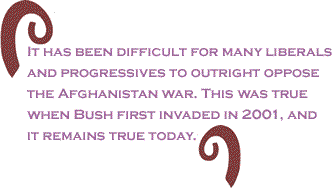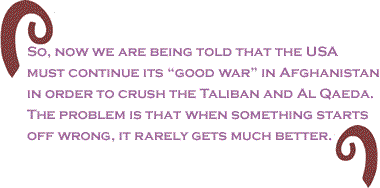
|
|||||||||||||||||||||||

|
|

Custom Search
|
|
 |
|
Sometimes I feel like I am reliving the era of President Lyndon B. Johnson. The era of “guns and butter,” as they called it. At the same time that Johnson was launching his “War on Poverty” he was escalating the US war against the people of Vietnam and Laos, as well as carrying out the criminal invasion of the Dominican Republic (1965). Not only did these interventions (and others!) isolate the USA and set back the efforts of these various countries at self-determination, but they wrecked the US economy, siphoning off badly needed resources. So, here we are today with the Obama administration carrying out a cautious and VERY partial withdrawal from Iraq (50,000 US troops will remain), while at the same time escalating the US troop presence in Afghanistan. Compounding this situation are US military attacks within Pakistan, an activity that is the equivalent of pouring kerosene on an open fire. And just like President Johnson, President Obama has an ambitious domestic agenda. It has been difficult for many liberals and progressives to outright oppose the Afghanistan war. This was true when Bush first invaded in 2001, and it remains true today. Following the 11 September 2001 terrorist attacks, many people in the USA, including but not limited to the Bush administration, were looking for revenge. In fact, there were those who said quite explicitly that revenge should take precedence over justice. And so we got it…revenge that is.
So, should the Sandinistas have attacked Honduras, overthrown the Honduran government, and perhaps have attacked Miami for good measure? How do you think that much of the world would have responded? In fact, the Sandinistas went to the World Court and brought charges against the USA. The Nicaraguans prevailed in the Court, to the surprise of everyone, yet it did not matter because the USA ignored the judgment of the Court.
The Taliban government of Afghanistan, as despicable as they were, did not carry out the assault on 11 September 2001. It was easier, however, for Bush to carry out a conventional assault against the people that only a few short months prior they had been treating as potential business partners. In carrying out that invasion the US walked into a quagmire that anyone who studied Central Asia could have (and many had) predicted. In fact, the Soviet Union had a horrific experience in Afghanistan a dozen years earlier. So,
now we are being told that the USA must continue its “good war”
in Afghanistan in order to crush the Taliban and Al Qaeda. The problem
is that when something starts off wrong, it rarely gets much better.
In fact, not only has the military situation been worsening due
to a combination of bungling, corruption and cultural blindness
by the invaders, but the regional political situation has been deteriorating.
A popular movement in Pakistan brought an Further US involvement in Afghanistan brings no assurance of victory. More importantly, the conflict must be resolved politically. The puppet regime in Kabul has so alienated the population that they have little control outside of the city itself. The population which, in some cases welcomed the US invasion has turned against the US and their NATO and warlord allies even if they have no love for the Taliban. There is nothing that should lead anyone to believe that this will change with the introduction of even more US forces, even if the USA spreads money around the way that they did in Iraq in order to buy off opposition. It is not just that furthering the Afghanistan aggression takes badly needed funds away from domestic projects in the USA. That should be a given. More importantly, the Afghanistan situation is integrally linked to the internal situation in Pakistan as well as the Pakistani conflict with India (over the Kashmir). There is little that the Obama administration is currently doing that seems to recognize the extent of the potential spillover affect from further military escalation. This in a region where there are two nuclear powers within minutes of turning each other into ashes, and seem to be driven toward this end. BlackCommentator.com
Executive Editor, Bill Fletcher, Jr., is a Senior Scholar with the
Institute for Policy Studies,
the immediate past president of TransAfrica Forum and co-author of, Solidarity Divided: The Crisis in Organized Labor and a New Path
toward Social Justice |
|
Any BlackCommentator.com article may be re-printed so long as it is re-printed in its entirety and full credit given to the author and www.BlackCommentator.com. If the re-print is on the Internet we additionally request a link back to the original piece on our Website. Your comments are always welcome. eMail re-print notice
If you send us an eMail message we may publish all or part of it, unless you tell us it is not for publication. You may also request that we withhold your name. Thank you very much for your readership. |
|
| |
|
| April
2 , 2009 Issue 318 |
|
| Executive Editor: Bill Fletcher, Jr. |
| Managing Editor: Nancy Littlefield |
| Publisher: Peter Gamble |
| Est. April 5, 2002 |
Printer Friendly Version
in resizeable plain
text format or pdf
format. |
| Frequently Asked Questions |
 |

|
 |
 |
 |
| |
| |




































